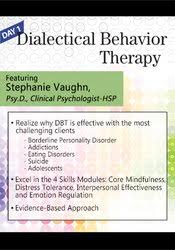Dialectical Behavior Therapy: For Clients – Stephanie Vaughn
$199.00 Original price was: $199.00.$56.00Current price is: $56.00.
Proof of item:
Designed in the early 1990s, Dialectical Behavior Therapy (DBT) gives hope and confidence to clinicians and clients alike. DBT was originally used to treat chronic suicidal individuals. However, clinicians across the country are using DBT to help treat individuals with a wide range of mental illnesses including but not limited to Borderline Personality Disorder, eating disorders, and addictions.
This seminar recording is designed to help you understand why DBT is so effective with your clients and how it works with borderline personality disorder and other mental health disorders. You will also have a solid foundation in DBT through training. Speaker Dr. Stephanie Vaughn will help you demystify topics related to DBT and borderline personality disorder.
Known as a third-wave therapy, DBT moves away from the strict change strategies found in traditional treatments. In DBT, the therapist and the client balance these traditional change strategies with acceptance and mindfulness. It’s the constant back and forth movement between acceptance and change that makes DBT unique.
- Articulate the theories of DBT and their importance.
- Assess the 5 Modes and Functions of DBT Treatment.
- Utilize the Stages of Treatment in DBT in your practice.
- Utilize a variety of DBT skills for treating mental health symptoms, chemical dependency and complex co-morbidity.
- Teach DBT skills in the areas of Mindfulness, Distress Tolerance, Emotional Regulation and Interpersonal Effectiveness.
- Articulate a variety of strategies for teaching DBT skills to clients.
Overview of DBT
- Why Dialectics and what does that mean anyway?
- Common “Dialectical Dilemmas” of clients with Borderline Personality Disorder
- Borderline Personality Disorder Defined and Re-Defined
- Biosocial Theory of Borderline Personality Disorder… Etiology and why we need to know it
- Engendering compassion and empathy for this “difficult-to-treat” population
- Current research on DBT and why it is important to know it
Modes and Functions of DBT
- Individual Therapy — enhancing motivation
- Telephone Consultation — enhancing generalization
- DBT Consultation Group — enhancing motivation & skill of the therapist
- Skills Training — enhancing capabilities
- Ancillary Treatments — structuring the environment
Stages and Targets of DBT — Structuring the Treatment
- Pre-Treatment Stage: Orienting the client to treatment and getting commitment
- Stage 1 Target Behaviors: Decrease life-threatening, therapy interfering and quality of life interfering behaviors and increase DBT skills
- Stage 2 Target Behavior: Decrease posttraumatic stress responses
- Stage 3 Target Behavior: Increase self-respect and achieve individual goals
- Stage 4 Target Behavior: Increase joy, freedom and spiritual fulfillment
- Targeting Strategies…What to treat and when
The Diary Card
- How to teach a client to fill out a diary card
- Review a diary card in an individual therapy session
- Where to look and what to treat on a diary card
DBT Skills Training
- Demographics and structure of the DBT Skills Training Group
- Rules of DBT Skills Training Group
- Targets of DBT Skills Training Group
- Roles of facilitators
Core Mindfulness Skills
- The “Core” Skills in DBT Skills Training
- Become more mindful of thoughts, feelings and urges and acting with intuition
- Decrease the amount of judgments clients make about themselves and others
- Participating and “throwing yourself in” (with a Wise Mind of course)
Distress Tolerance Skills
- Tolerate and survive a crisis (without making it worse)
- “Distract” themselves in their attempts to regulate their emotions
- Self-Soothing the five senses in times of a crisis
- “Radically Accepting” the crisis as it is and letting go of the struggle
Interpersonal Effectiveness Skills
- Skills to help clients make requests and say NO (and have it stick)
- Teaching clients how to improve and attend to relationships
- Self-Respect in the client and the respect others have for them
Emotion Regulation Skills
- Regulate or even change intense emotions
- Decrease emotional vulnerability in your client
- Decrease negative emotions and increase the positive (and staying mindful of them)
- “Building a Life Worth Living”
Please Note: PESI is not affiliated or associated with Marsha M. Linehan, PhD, ABPP, or her organizations.
Get Dialectical Behavior Therapy: For Clients of author Stephanie Vaugh
Tag: Dialectical Behavior Therapy: For Clients – Stephanie Vaughn Review. Dialectical Behavior Therapy: For Clients – Stephanie Vaughn download. Dialectical Behavior Therapy: For Clients – Stephanie Vaughn discount.
1 review for Dialectical Behavior Therapy: For Clients – Stephanie Vaughn
| 5 star | 100 | 100% |
| 4 star | 0% | |
| 3 star | 0% | |
| 2 star | 0% | |
| 1 star | 0% |
Sorry, no reviews match your current selections
Q & A
Related products
Personal Development
Personal Development
Personal Development
Personal Development
Cameron Blas – Filming And Editing Mastery With Final Cut Pro X
Personal Development
Personal Development
Personal Development
Personal Development














Wonderful transaction. Great communication. Thank you | Dialectical Behavior Therapy: For Clients – Stephanie Vaughn